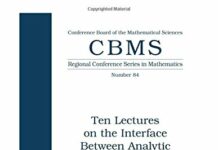
Ebook Info
- Published: 2012
- Number of pages: 572 pages
- Format: PDF
- File Size: 2.26 MB
- Authors: Hugh L. Montgomery
Description
Prime numbers are the multiplicative building blocks of natural numbers. Understanding their overall influence and especially their distribution gives rise to central questions in mathematics and physics. In particular, their finer distribution is closely connected with the Riemann hypothesis, the most important unsolved problem in the mathematical world. This book comprehensively covers all the topics met in first courses on multiplicative number theory and the distribution of prime numbers. The text is based on courses taught successfully over many years at the University of Michigan, Imperial College, London and Pennsylvania State University.
User’s Reviews
Editorial Reviews: Review “The monograph is a very readable, concise presentation of classical prime number theory, giving techniques as well as the underlying ideas, and describing an incredibly large range of topics. A study of this monograph seems to be a must for every number theorist. Hopefully this volume will be available as soon as possible, to renew and broaden the interest in this highly interesting field of analytic prime number theory.” Wolfgang Schwarz, Mathematical Reviews Book Description A 2006 text based on courses taught successfully over many years at Michigan, Imperial College and Pennsylvania State.
Reviews from Amazon users which were colected at the time this book was published on the website:
⭐One of the bible of analytic number theory. It is a good reference book also a good textbook!
⭐I’m a physicist and like to study analytic number theory. This book provides an excellent tool for self study, it is the best I have seen at motivating the material and giving just the right amount of detail. It would help the reader to have gone through a bit of elementary number theory as a prerequisite, with that being done this book leads one through the proof of the prime number theorem and to important results on the Riemann zeta function. Highly recommended!
⭐I learned analytic number theory from Davenport,
⭐. Montgomery and Vaughan are much better to learn from than Davenport. The only topic that Davenport covers and this book doesn’t is Vinogradov’s proof that all sufficiently large odd integer is a sum of three primes. In fact, the authors say in the preface that this, along with exponential sums, uniform distribution and other topics, will appear in the second volume. But even if that volume never appears this book is the best place to learn analytic number theory. It is systematic and clearly written. It doesn’t describe as much material as Iwaniec and Kowalski,
⭐, but Iwaniec and Kowalski is best used as a reference, and from experience I think it is a bad plan to learn from Iwaniec and Kowalski; from that and his books on automorphic forms, I think that Iwaniec either doesn’t care about good exposition or is bad at it, and thus a learner should avoid his books. While Iwaniec and Kowalski are systematic but hard to understand, Davenport is clear and in fact a beautiful writer but not systematic. Davenport does not organize the results he proves into numbered theorems, and instead each chapter is a lecture that is then used in later chapters, sometimes without being explicitly mentioned. Furthermore, Davenport doesn’t use the language of the Fourier transform on the integers modulo q, which is the most coherent way to talk about arithmetical functions with period q such as Dirichlet characters and Gauss sums. Montgomery and Vaughan are writing about prime numbers; for modular forms, the most accessible book I know that uses them to do number theory is Apostol,
⭐.
⭐… and sorry I didn’t find it until now! I confess I have so far only read a little bit of it, but I love it already, and this fills a big gap in the analytic number theory literature.It is a big book, around 500 pages, giving the reader an introduction to classical analytic number theory. For the most part it is simple and sticks to the basics, but it also goes into a large number of interesting digressions which will be welcomed by all — beginners included.If you are a budding analytic number theorist, buy Davenport and read it cover to cover. Also get Iwaniec and Kowalski which is a very good high-level exposition, designed to push you towards the research literature. But this is a great book to have around, especially when inevitable questions come up; it has illuminating, explicit, clear discussions of a variety of topics which aren’t easily found elsewhere in the literature. I’m going to be returning my library copy next week, because I’m buying this puppy.
Keywords
Free Download Multiplicative Number Theory I: Classical Theory (Cambridge Studies in Advanced Mathematics, Series Number 97) in PDF format
Multiplicative Number Theory I: Classical Theory (Cambridge Studies in Advanced Mathematics, Series Number 97) PDF Free Download
Download Multiplicative Number Theory I: Classical Theory (Cambridge Studies in Advanced Mathematics, Series Number 97) 2012 PDF Free
Multiplicative Number Theory I: Classical Theory (Cambridge Studies in Advanced Mathematics, Series Number 97) 2012 PDF Free Download
Download Multiplicative Number Theory I: Classical Theory (Cambridge Studies in Advanced Mathematics, Series Number 97) PDF
Free Download Ebook Multiplicative Number Theory I: Classical Theory (Cambridge Studies in Advanced Mathematics, Series Number 97)

